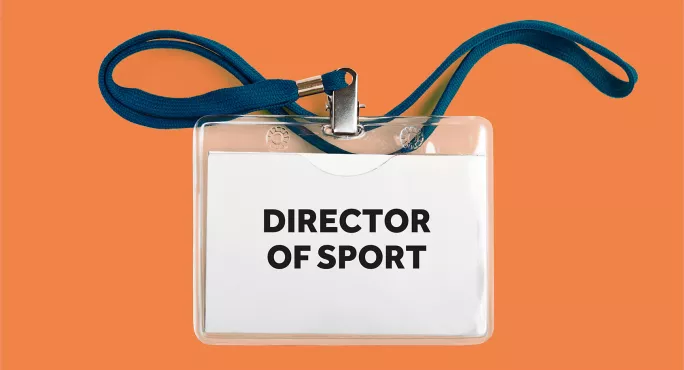How do I become a director of sport?

If you’re looking for a career in education that really works up a sweat, you may well harbour dreams of becoming a director of sport.
But when it comes to this leadership role, there is more to it than just the playing field.
In this article, we’ll look at the particulars of the role and how you can gain the experience required.
What does ‘director of sport’ mean?
A director of sport is a middle leadership position that exists in the majority of independent prep and senior schools.
Read: How to become an assistant head
Watch: Two-minute tutorials for job hunters
Listen: How to interview candidates on lockdown
What responsibilities might they have?
Directors of sport are responsible for overseeing every aspect of a school’s sporting provision. According to Neil Rollings, chairman of the Professional Association of Directors of Sport in Independent Schools (PADSIS), the role has evolved in recent years to have three principal focuses: leadership, culture building and quality control.
The specific nature of these leadership responsibilities will vary across different schools, but most directors of sport will line-manage the heads of individual sports such as netball, hockey, and rugby, as well as being ultimately responsible for every coach, both internal and external, involved in the school’s sporting programme.
“There used to be an expectation that every pupil would take part in compulsory competitive sport, typically traditional games like rugby, cricket and hockey,” says Rollings, a former director of sport at Sedbergh School and Cheltenham College. “Now that school sport is governed by choice, culture is far more important.”
Directors of sport are, therefore, expected to oversee a culture that makes sport an attractive proposition for pupils, without compelling them to take part. Crucially, though, while most schools have evolved to allow pupils a greater degree of choice, there still tends to be an expectation that this should sit alongside a competitive programme that allows the most talented and dedicated pupils to pursue high performance.
“One of the main challenges is to retain a critical mass of pupils in traditional games while also offering quality alternatives,” Rollings notes.
In order to guarantee the quality of their school’s sporting provision, directors of sport need to ensure that coaches have sufficient training and expertise to carry out their roles safely and in the best interests of the pupils in their care.
Most schools’ strategic plans for sport incorporate the twin aims of performance and participation alongside encouraging health and fitness. Directors of sport are responsible for ensuring that the various components of their sporting programme are consistent with these success criteria.
In some schools, the director of sport will also be responsible for the delivery of physical education, although many have chosen to appoint separate heads of PE to oversee the academic subject.
How do I become a director of sport?
Director of sport positions tend to be open to both internal and external candidates, which makes the application process extremely competitive.
Applicants will typically either be PE teachers or established school sports coaches, or be looking to move directly from professional sport into education.
The changing nature of the role has meant that you now need to possess a broader range of competencies: being a good organiser and a leading coach was once deemed sufficient, but candidates are now expected to demonstrate an understanding of the broad school sporting landscape, a commitment both to encouraging participation and facilitating high performance, and the communication skills to act as an advocate for sport with pupils, parents and colleagues.
Dani Mugridge, director of sport and outward bound activities at Lady Eleanor Holles School, believes that it is advantageous to have experience of elite sport as well as a strong background in sport pedagogy and education.
Before moving to her current role in August 2019, she had worked as a director of sport and head of PE in a number of independent schools, while also working in professional sport as the assistant coach of Surrey Storm Netball Superleague team.
“The benefit of working in elite sport is having a greater understanding of what you need to do as a sportsperson to get to the top,” Mugridge says. “It gives you fantastic connections across various sports where you can share and discuss ideas.”
Rollings estimates that between 15 and 20 per cent of director of sport roles in senior schools are now being awarded to candidates applying from outside the education sector, most of whom come straight into the post from professional sport.
Generally, people working in the independent sector will either be prep or senior specialists for the duration of their career, but there is more movement between the age ranges in director of sport roles.
Lorcan O’Brien, currently director of sport at Dulwich Prep in London, previously held the same post at Kingston Grammar School. While acknowledging the obvious differences between prep and senior schools, he feels that the roles require similar skills.
“The difference between the job in prep and senior school is very, very small,” O’Brien says. “I think the most obvious difference is the weight of responsibility you have as a director of sport at prep level to guide young boys and girls in the right direction, in terms of their values, emotional development and passion for physical activity. This is also a vital part of senior school life, but at prep school the pupils are naturally younger and perhaps more receptive to being guided.
“Outside that, the skills that are needed to do the role as director of sport at either prep or senior school are universal: teaching, managing, organising, leading a team, connecting with people, building relationships and communicating well.”
When is the right time to become a director of sport?
Given the varied and demanding responsibilities of the role, it is expected that aspiring directors of sport will have amassed a significant amount of relevant experience, whether in school or elite sporting environments.
Former England rugby player Tony Diprose spent 13 years in various coaching and management roles at Harlequins before becoming director of sport and physical wellbeing at Canford School in January 2020.
He acknowledges that there are many differences between professional sport and the more rounded school environment where he now works, but feels that his time at Harlequins gave him a number of transferable skills.
“Fundamentally, in both jobs, there’s the similar end of trying to enable people to become the best they can be, and having constructive relationships with all the key stakeholders - the children themselves, their parents, your colleagues - is the common ingredient for facilitating that.”
In particular, Diprose cites similarities between managing a team of academy coaches and overseeing the sports and academic staff at Canford, while his experience of devising and implementing a strategic plan at Harlequins is now being brought to bear as he evaluates the sports and physical wellbeing programme at Canford and assesses how it can be improved.
Having a demonstrable track record of running a school sports programme may be helpful, although Rollings adds a caution. “Experience of running one sport in a school is the most obvious starting point, but there is a significant gulf between running one silo and overseeing a number of silos and preventing them from competing with each other. The challenge is to see a bigger picture rather than just driving one thing.”
I’m hoping to apply for director of sport posts next year. What should I do now?
This will largely depend on your present role. If you are currently working in professional sport, you should try to gain an understanding of the sporting landscape in schools.
Diprose recommends speaking to existing directors of sport, ideally a mixture of those who have come from professional environments and those who have progressed through the more traditional teaching route. “I picked the brains of people in prep and senior schools to see what I was best suited to,” he says. “I’d recommend spending half a day or a full day in a school, and seeing what you can learn about the environment.”
Regardless of your current position and the type of school you would like to work in, there are a number of professional development opportunities that will help to prepare you. Both PADSIS and Independent Coach Education, another organisation spearheaded by Rollings, offer courses and conferences aimed at advising future directors of sport and supporting those already in post.
Where could the role lead?
Although director of sport posts are arguably too demanding and important to be regarded as stepping stones, the skills and experience that you will amass could be instrumental in helping you to secure another role in the future.
A number of former directors of sport have been promoted to senior management positions such as assistant head (co-curricular), while others have chosen to move into professional sport, either working on development pathways or as elite coaches.

